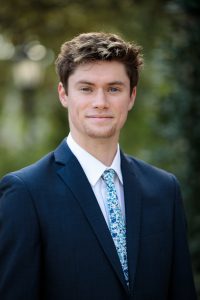
This student was also awarded Outstanding Student in the Academic Study of Religion
Majors: Religious studies and history (concentration in legal history)
Minors: Randall Research Scholars Program and Blount Scholars Program
Hometown: Fort Lauderdale, Florida
Favorite Experience at UA: My favorite experience at the University of Alabama has been the creation — and eventual flourishing — of the Crimson Historical Review, UA’s first (and only) peer-edited history journal. The CHR began with a few energetic students — myself included — all eager to provide rich research opportunities for fellow undergraduates. With this small staff, the journal produced a quality, albeit limited, initial issue; and since, the Review has blossomed, becoming one of the nation’s most prestigious student-run publications. This semester, for instance, the CHR received a record fifty-five submissions from a diverse body of undergraduates, both geographically — from Harvard, Brown, and British Columbia (Canada), to name a few — and methodologically — presenting intellectual, intersectional, and material histories. Far more important than the reputation of the Review, however, was (and still is) the formation of a community around it. This community, composed of dozens of UA students passionate about history, writing, and scholarly publication, is sharp, supportive, and constantly self-improving. In fact, one of my foremost privileges as Editor-in-Chief is witnessing review board members dissect the substance and argumentation of an article, or copy editors correct and perfect an author’s prose; I learn so much from them all and their varied interests, approaches, and expertise. Further, though we meet predominantly on Zoom, my continued interaction with CHR staff brightens and enthuses me, especially in present times, when we are more disconnected from our scholastic peers than ever before.
Favorite Class: My favorite class I have taken at UA is Dr. Lucy Kaufman’s HY 383, “Living in Tudor England.” What I cherish most about this course is how it transformed my approach to historical inquiry, reminding me of the subject’s eminently human dimensions. To this effect, Dr. Kaufman’s well-curated syllabus prioritized stories previously silenced — or constrained by — reductionist scholarship. I heard — and indeed, read — the voices of the toiling yeoman, common artisan, abandoned wife, and doting mother. (We even perused the medical file of a young man from Coventry “sick in his love‚” heart-broken in the sixteenth-century!) This is all to say, the class introduced me to people different in their chronology, circumstance, and context and insisted that I commune with them; the historian and their object of study, each unadorned in their humanity. What is more, the course was set in Oxford, an ideal location. In the city’s topography — its streets, buildings, churches, and libraries — I engaged tangibly with the material I was learning, which proved a truly humbling experience. I would be remiss, however, to not also mention honorably Dr. Margaret Peacock‚’s HY 394, “The Historian’s Craft” — in my opinion, the best introduction to the method and practice of history in the country –, Dr. Nathan Loewen’s REL 231, “Religious Existentialism‚” — a veritable ‘who’s-who‚’ of excellent philosophical minds –, and Dr. Edith Szanto’s REL 436, “Making Islam” — an admirably reflexive consideration of authenticity and authority in the religion.
Future Plans: My immediate future plans are to attend the University of Oxford and receive an M.Phil. in early-modern history, writing a thesis related to the formation of the English state, the development of laws concerning suicide, murder, and suspicious death, and their connection. Past that, I have a few career goals, and I am not sure I can select one at the moment. Some of me would enjoy taking the professorial route, but I recognize that the market is quite saturated and the jobs few and far between. (Having discretion in this regard may be the better part of my valor.) I am also deeply passionate about carceral education in juvenile settings. To have a child in a detention center (or prison, for that matter) is to concede that our social systems have failed them; nevertheless, they deserve to commune with their surrounding environment, society, and nation — the sort of feeling a robust, humanistic curriculum creates. Building off these beliefs, then, I might pursue social work and/or public interest law (concerning prison reform and abolition). These are, of course, just a few options, and, since I began college, my aspirations have changed quite dramatically; fortunately, I have a bit more time to explore and investigate.